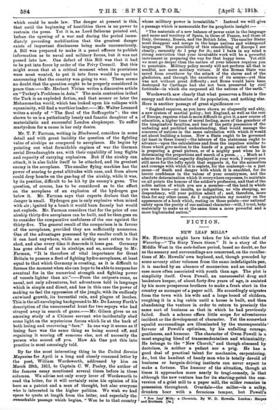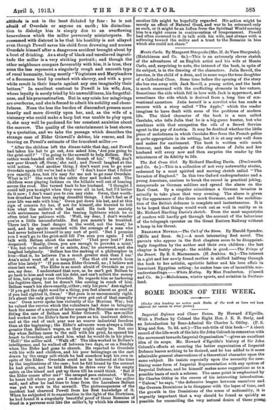FICTIO N.
NEW LEAF MILLS.*
Mn. HOWELLS might have taken for his sub-title that of Waverley—" 'Tie Sixty Years Since." It is a story of the Middle West in the ante-bellum period, based no doubt, so far as the scenery and surroundings are concerned, on the recollec- tions of Mr. Howells' own boyhood, and, though preceded by some seventy other volumes from the same indefatigable pen, it is marked by an absence of mannerism and an unstudied ease more often associated with youth than age. The plot is simplicity itself. Owen Powell, an unsuccessful drug and bookstore keeper, of about forty-five years of age, is assisted by his more prosperous brothers to make a fresh start in the country as manager of a paper mill. He accordingly migrates from the town with his wife and a large brood of children, roughing it in a log cabin until a house is built, and then abandoning the venture in order to return to precisely the same sort of business as that in which he bad previously failed. Such a scheme offers little scope for adventurous incident or the development of character. Yet the somewhat squalid surroundings are illuminated by the unconquerable • fervour of Powell's optimism, by his unfailing courage, gentleness, and humour. The character of Owen Powell is a most engaging blend of transcendentalism and whimsicality. He belongs to the "New Church," and though obsessed by doctrines, is neither a pedant nor a prig. He has a good deal of practical talent for mechanics, carpentering, &c., but the handiest of handy men who is totally devoid of business or bargain-driving instincts can never expect to make a fortune. The humour of the situation, though at times it approaches more nearly to tragi-comedy, is that although the new venture has for its starting-point the C011- version of a grist mill to a paper mill, the miller remains in possession throughout. Overdale—the miller—is a sulk)/ drunken boor with a ferocious temper, but Powell's • Pow Leaf Mills: a Chronicle. By W. 1). Howells. London : and Brothers. [tis.j
Harper attitude is not in the least dictated by fear : he is not afraid of Overdale or anyone on earth ; his disinclina- tion to dislodge him is simply due to an overflowing benevolence which the miller perversely misinterprets. So consumed with distrust is he that his hostility is not allayed even though Powell saves his child from drowning and nurses Overdale himself after a dangerous accident brought about by a bout of drinking. As a study of black and unrelieved ingrati- tude the miller is a very striking portrait ; and though the other neighbours compare favourably with him, it is true, they none the less represent a singularly rough and uncouth type of rural humanity, being mostly "Virginians and Marylanders of a fierceness bred by contact with slavery, and with a poor white revolt in their hearts against any one imaginably their betters." In excellent contrast to Powell is his wife, Ann, whose loyalty is sorely tried by his unworldliness, his forgetful- ness, and his procrastination. But in any crisis her misgivings are overborne, and she is forced to admit his nobility and cheer- fulness. None the less the burden of discomfort presses more heavily and more directly upon her, and, as the wife of a visionary who could make a harp but was unable to play upon it, she may well be pardoned for her constant anxieties about the morrow. The quality of the entertainment is best shown by a quotation, and we take the passage which describes the strange case of Elder Griswell's debtor, his rescue, and its bearing on Powell's estimate of the truculent miller :—
" After the children left the dinner-table that day, and Powell had taken his hat to go out, Ann asked him, 'Are you going to the grist-mill?' I'm going to the sawmill to help Bellam. He's rather weak-handed still with that thumb of his." Well, don't saw your thumb off, Owen,' she said; and Powell laughed at the wild notion. 'And another thing, I don't want you to go near Overdale again till we've had a talk.' I don't know that I follow you exactly, Ann, but it's easy for me not to go near Overdale. What is it?' She went to the cabin door and looked out. The children were playing Indians on the hillside well out of hearing across the road. She turned back to her husband. thought I could tell you to-night when they were all in bed, but I'd better do it now; I don't want you to run any risks. Owen, that worth- less drunkard has been saying dreadful things. I don't feel as if your life was safe with him.' Owen put down his hat, and at this sign of concern for her, if not for himself, she hurried to tell him what the miller's wife had said. He took her anxiety with seriousness instead of the teasing lightness which he so often tried her patience with. • Well, my dear, I don't wonder you're a little uncomfortable. But you mustn't be troubled. There isn't the least danger in the world, not the least,' he said, and his spirits mounted with the courage of a man who had never believed himself in any sort of peril. But I promise you I won't go to the grist-mill till I've seen you again. I will talk with Bellam about the matter." That poor lout ? ' Ann despaired. 'Really, Owen, you are enough to provoke a saint.'
• Yes, but we're neither of us saints, Ann,' he answered, and she laughed helplessly. • Bellam has the making of a philosopher in him—that is, he believes I'm a much greater man than I am.' Ann's mind went off at a tangent. Has that old wretch been after him lately?' If you mean Elder Griswell, no ; I believe not since last week. The Elder is as much afraid of Overdale as you are, my dear. I understand that now, as he can't get Bellam to go back to him and work out his debt, and can't collect the money of him, he's going to sue Overdale. He regards him as harboring his fugitive slave, but he doesn't like coming in reach of him. Bellam wasn't his slave exactly, either; only his peon.' Ann sighed.
• If you get the right word for a thing, you feel almost as good as if you had righted it, Owen." But peon is so uncommonly right. it's about the only good thing we've ever got out of that rascally war.' Owen never spoke less violently of the Mexican War ; but he valued the service which the volunteers had done in bringing back the name of a system of labor among the Mexicans so exactly fitting the case of Bellam and Elder Griswell. The saw-miller had worked on the Elder's farm for years as his insolvent debtor, and at the end of each year was no nearer industrial freedom than at the beginning ; the Elder's advances were always a little greater than Bellam's wages, as they might easily be. But one day when Bellam came to the mill with his grist, he opened his heart to Overdale, and asked him what he would do in his place. 'Hell!' the miller said. 'Walk off.' The idea worked in Bellam's intelligence, and he walked off between two days, or on a Sunday when the Elder bad gone to church. He reported to Overdale with his wife and children, and his poor belongings on the cart drawn by the rangy colt which he had somehow kept his own in spite of the Elder. Overdale could not be bothered at the time by the implications of the case ; but he felt bound 14 the counsel he had given, and be told Bellam to drive over to the empty cabin on the island and put up there till he could think. But if the Elder comes after me ? ' the escaped peon entreated. When he hears tell where you are I reckon he won't come,' the miller said; and after he had time to hear from the Larrabees Bellam was put to work in the sawmill. The picturesqueness of the incident had charmed Powell from his first knowledge of it. When he subjected it to examination in the light of the Doctrines, he had found it a singularly beautiful proof of those Remains of Good in a perverse soul like the miller's, by which his chances in another life might be hopefully regarded. His action might ho merely an effect of Natural Good, and was to be esteemed only as such, or it might be an Influx from the Spiritual World moving him to a right course in contravention of temperament. Powell had often recurred to it in talk with his wife, and always with a softening toward the miller and a trust to the Remains in hint which she could not share."















































 Previous page
Previous page